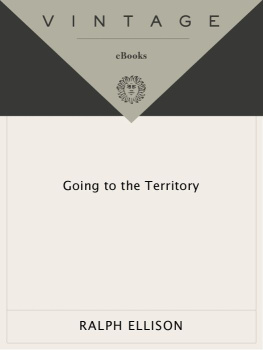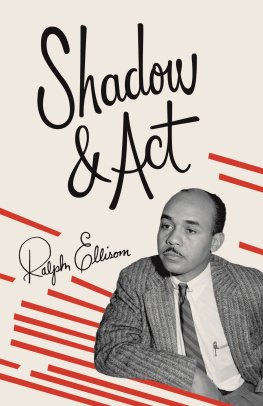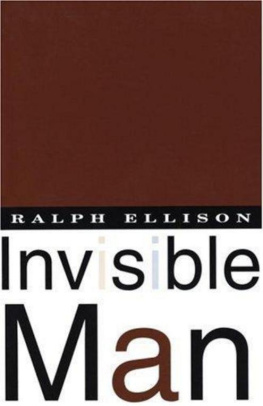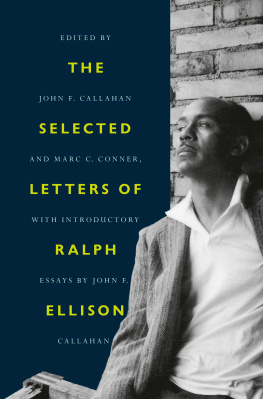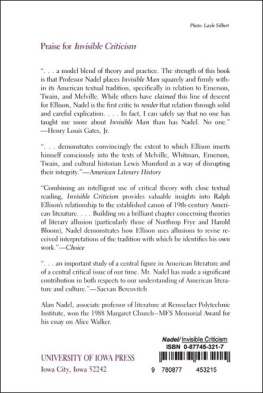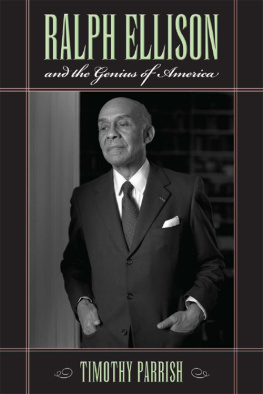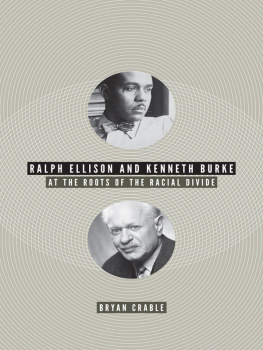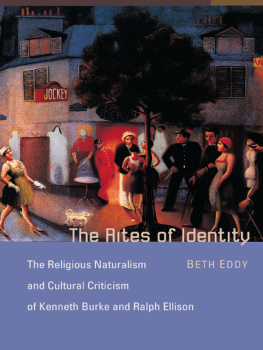Ralph Ellison - Going to the Territory
Here you can read online Ralph Ellison - Going to the Territory full text of the book (entire story) in english for free. Download pdf and epub, get meaning, cover and reviews about this ebook. year: 2011, publisher: Knopf Doubleday Publishing Group, genre: Detective and thriller. Description of the work, (preface) as well as reviews are available. Best literature library LitArk.com created for fans of good reading and offers a wide selection of genres:
Romance novel
Science fiction
Adventure
Detective
Science
History
Home and family
Prose
Art
Politics
Computer
Non-fiction
Religion
Business
Children
Humor
Choose a favorite category and find really read worthwhile books. Enjoy immersion in the world of imagination, feel the emotions of the characters or learn something new for yourself, make an fascinating discovery.
- Book:Going to the Territory
- Author:
- Publisher:Knopf Doubleday Publishing Group
- Genre:
- Year:2011
- Rating:4 / 5
- Favourites:Add to favourites
- Your mark:
- 80
- 1
- 2
- 3
- 4
- 5
Going to the Territory: summary, description and annotation
We offer to read an annotation, description, summary or preface (depends on what the author of the book "Going to the Territory" wrote himself). If you haven't found the necessary information about the book — write in the comments, we will try to find it.
Going to the Territory — read online for free the complete book (whole text) full work
Below is the text of the book, divided by pages. System saving the place of the last page read, allows you to conveniently read the book "Going to the Territory" online for free, without having to search again every time where you left off. Put a bookmark, and you can go to the page where you finished reading at any time.
Font size:
Interval:
Bookmark:
Ralph Ellison
GOING TO THE TERRITORY
Ralph Ellison was born in Oklahoma and trained as a musician at Tuskegee Institute from 1933 to 1936, at which time a visit to New York and a meeting with Richard Wright led to his first attempts at fiction. His reviews, short stories, articles, and criticism appeared in many national magazines and anthologies. His novel, Invisible Man, won the National Book Award and the Russwurm Award. From 1955 to 1957 Ellison was a fellow of the American Academy in Rome. He subsequently taught at Bard College and in 1961 served as an Alexander White Visiting Professor at the University of Chicago. From 1962 to 1964 he was Visiting Professor of Writing at Rutgers University. During 1964 he delivered the Gertrude Clark Whittall Lecture at the Library of Congress and the Ewing Lectures at the University of California. He was appointed to the American Academy of Arts and Letters in 1964. From 1970 to 1980 he was Albert Schweitzer Professor of Humanities at New York University. He was a charter member of the National Council on the Arts and Humanities, a member of the Carnegie Commission on public television, a trustee of the John F. Kennedy Center for the Performing Arts, and a trustee of the Colonial Williamsburg Foundation. He is also the author of another collection of essays, Shadow and Act. Ralph Ellison died in 1994.

BOOKS BY Ralph Ellison
Invisible Man
Shadow and Act
Going to the Territory
The Collected Essays of Ralph Ellison
Flying Home and Other Stories
Juneteenth
Trading Twelves: The Selected Letters of Ralph Ellison and Albert Murray


FIRST VINTAGE INTERNATIONAL EDITION, MARCH 1995
Copyright 1986 by The Ralph and Fanny Ellison Charitable Trust
All rights reserved. Published in the United States by Random House, Inc., New York, and in Canada by Random House of Canada Limited, Toronto. Originally published, in hardcover, by Random House, Inc., New York, in 1986.
Library of Congress CataloginginPublication Data
Ellison, Ralph
Going to the territory
I Title.
[PS 3555.L625G6 1987] 818.5409 8646191
eISBN: 978-0-307-79738-4
constitutes an extension of this copyright page
http://www.vintagebooks.com
v3.1_r1
To my wife,
Fanny

The
Little Man at Chehaw
Station
I t was at Tuskegee Institute during the mid-1930s that I was made aware of the little man behind the stove. At the time I was a trumpeter majoring in music and had aspirations of becoming a classical composer. As such, shortly before the little man came to my attention, I had outraged the faculty members who judged my monthly students recital by substituting a certain skill of lips and fingers for the intelligent and artistic structuring of emotion that was demanded in performing the music assigned to me. Afterward, still dressed in my hired tuxedo, my ears burning from the harsh negatives of their criticism, I had sought solace in the basement studio of Hazel Harrison, a highly respected concert pianist and teacher. Miss Harrison had been one of Ferruccio Busonis prize pupils, had lived (until the rise of Hitler had driven her back to a U.S.A. that was not yet ready to recognize her talents) in Busonis home in Berlin, and was a friend of such masters as Egon Petri, Percy Grainger, and Sergei Prokofiev. It was not the first time that I had appealed to Miss Harrisons generosity of spirit, but today her reaction to my rather adolescent complaint was less than sympathetic.
But, baby, she said, in this country you must always prepare yourself to play your very best wherever you are, and on all occasions.
But everybody tells you that, I said.
Yes, she said, but theres more to it than youre usually told. Of course youve always been taught to do your best, look your best, be your best. Youve been told such things all your life. But now youre becoming a musician, an artist, and when it comes to performing the classics in this country, theres something more involved.
Watching me closely, she paused. Are you ready to listen?
Yes, maam.
All right, she said, you must always play your best, even if its only in the waiting room at Chehaw Station, because in this country therell always be a little man hidden behind the stove.
A what?
She nodded. Thats right, she said. Therell always be the little man whom you dont expect, and hell know the music, and the tradition, and the standards of musicianship required for whatever you set out to perform!
Speechless, I stared at her. After the working-over Id just received from the faculty, I was in no mood for joking. But no, Miss Harrisons face was quite serious. So what did she mean? Chehaw Station was a lonely whistle-stop where swift north- or southbound trains paused with haughty impatience to drop off or take on passengers; the point where, on homecoming weekends, special coaches crowded with festive visitors were cut loose, coupled to a waiting switch engine, and hauled to Tuskegees railroad siding. I knew it well, and as I stood beside Miss Harrisons piano, visualizing the station, I told myself, She has GOT to be kidding!
For, in my view, the atmosphere of Chehaws claustrophobic little waiting room was enough to discourage even a blind street musician from picking out blues on his guitar, no matter how tedious his wait for a train. Biased toward disaster by bruised feelings, my imagination pictured the vibrations set in motion by the winding of a trumpet within that drab, utilitarian structure: first shattering, then bringing its walls a-tumbling downlike Jerichos at the sounding of Joshuas priest-blown ram horns.
True, Tuskegee possessed a rich musical tradition, both classical and folk, and many music lovers and musicians lived or moved through its environs, butand my regard for Miss Harrison notwithstandingChehaw Station was the last place in the area where I would expect to encounter a connoisseur lying in wait to pounce upon some rash, unsuspecting musician. Sure, a connoisseur might hear the haunting, blues-echoing, train-whistle rhapsodies blared by fast express trains as they thundered pastbut the classics? Not a chance!
So as Miss Harrison watched to see the effect of her words, I said with a shrug, Yes, maam.
She smiled, her prominent eyes a-twinkle. I hope so, she said. But if you dont just now, you will by the time you become an artist. So remember the little man behind the stove.
With that, seating herself at her piano, she began thumbing through a sheaf of scoresa signal that our discussion was ended.
So, I thought, you ask for sympathy and you get a riddle. I would have felt better if she had said, Sorry, baby, I know how you feel, but after all, I was there, I heard you; and you treated your audience as though you were some kind of confidence man with a horn. So forget it, because I will not violate my own standards by condoning sterile musicianship. Some such reply, by reaffirming the sacred principles of art to which we were both committed, would have done much to supply the emotional catharsis for which I was appealing. By refusing, she forced me to accept full responsibility and thus learn from my offense. The condition of artistic communication is, as the saying goes, hard but fair.
Next pageFont size:
Interval:
Bookmark:
Similar books «Going to the Territory»
Look at similar books to Going to the Territory. We have selected literature similar in name and meaning in the hope of providing readers with more options to find new, interesting, not yet read works.
Discussion, reviews of the book Going to the Territory and just readers' own opinions. Leave your comments, write what you think about the work, its meaning or the main characters. Specify what exactly you liked and what you didn't like, and why you think so.

